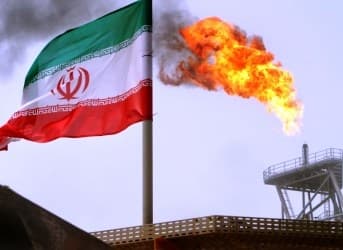The Iranian oil sector may be lagging because of declining revenue needed to keep the domestic sector afloat. The country was hit with economic sanctions during the summer amid growing concerns over its nuclear ambitions and OPEC figures show a general decline in crude oil production from the Islamic republic. U.S. energy statistics, meanwhile, predict Iran's crude oil production should fall more than 20 percent compared to last year's figures. From the Iranian perspective, however, all is well for No. 3 among OPEC nations.
Iranian Oil Minister Rostam Qasemi said neither crude oil sales nor production is impacted by sanctions imposed by Western governments. The U.S. and European governments during the summer targeted the country's energy sector as punishment for transparency issues with nuclear research. This week's annual meeting for the U.N. General Assembly brought Iran's behavior in the global community to the center stage given nuclear concerns and Tehran's allegiance to the Syrian government. Nevertheless, U.S. Secretary of State Hillary Clinton had provided leeway to some key U.S. allies. Despite a damning assessment from the International Atomic Energy Agency, Clinton said some countries would be shielded from sanctions for making "significant" cuts in crude oil purchases from Iran.
"I am pleased to announce that Belgium, the Czech Republic, France, Germany, Greece, Italy, Japan, the Netherlands, Poland, Spain, and the United Kingdom have again qualified for an exception to sanctions … based on reductions in the volume of their crude oil purchases from Iran," she said in a statement.
That protection allows those countries to continue making some crude oil purchases from Iran so long as the "significant" threshold is respected. Iran produced around 3.5 million barrels of oil per day last year, before sanctions honed in on the country's energy sector. The U.S. Energy Department's Energy Information Administration, however, expects production to fall to 2.7 million bpd this year and another 200,000 in 2013. Using information collected for the CIA's World Fact Book, that decline could theoretically knock Iran out of the Top 10 in terms of yearly crude oil production.
Qasemi, however, said sanctions weren't impacting the country's oil sector in the way Western governments had expected. Oil production in the Islamic republic for this year, he said, should remain at about the same level as for 2011. Using OPEC's figures, Iran has so far averaged around 2.9 million bpd, in line with EIA expectations. The minister said Iran's supplier base remained intact, however.
"Iran's crude is being supplied on the world markets and Iran has its traditional buyers," he said.
Despite the pressure, however, Iran is keeping some of its market activity going. Given Clinton's acceptance that at least some of Iran's oil is needed to keep markets moving, it's unlikely that Tehran would stay out of the Top 10. The global economy last year was squeezed when Libya, No. 15 based on CIA production figures, was shut out by war. Though concerns over Iran's nuclear activity are warranted, it appears that current sanctions on oil have reached the high-water water mark in terms of effectiveness.
"Sanctions, when we look at history, rarely work," argued U.S. Sen. John McCain.
By. Daniel J. Graeber of Oilprice.com



















The consequence is that the only reliable indicator of what is happening in and to Iran is how Iran is actually responding to global events. And thius far Iran does not seem to be unduly affected by any of the measures being taken against her.
She has China, India and other Asian Pacific countries continuing to buy oil from her. Europe only accounts for about 20% of her exports.
I think we need to be very sober in assessing Iran and to reverse our considerations of her. It would be appear far more likely that Iran is the rational actor in this high drama and that it is thre US and Israel who are increasingly running out of realistic options to manage Iran.
Iran is no worse than Pakistan or Israel in having a nuclear potential. It is Israel that irrationally favours striking because Iran has been gradually boxing Israel into a corner since 1979. Israel has no way out of that corner. All this nonsense about Iran striking Israel - does anyone seriously believe that Iran wants to irradiate Palestine for 500,000 years with a nuclear strike and to thraten Islam's 3rd holiest sacred shrine at Jerusalem?
Even the US has increasingly limited options. So everyone is playingbthe propaganda game. And eveyone is becoming increasingly more confused and perplexed by the blurring of thr distinction between propaganda and reality.
This is a situation entirely of the West's own making. A last attempt by an increasingly defunct Western system to push back the rising tide of the Asian Pacific region and its ME resource providers. The last 10 years of war have demonstrated how the West has effectively shot its bolt and must now await the consequences this 'Shift to the East', militarily, economically and above all psychologically.